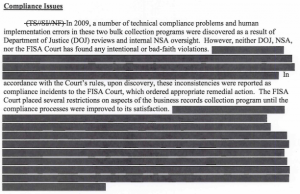NSA-Speak — Timely: (Adj.) 2-Month Delay
For some reason, this Ellen Nakashima story covering parts of what CNN, Wired, and I have already reported is generating a lot of attention today.
While I’m grateful that more people are catching on to what I’ve been harping on for months — that NSA justifies its entire Section 215 metadata dragnet with a case involving the transfer of less than $10,000 to al-Shabaab — there’s one point that further demonstrates the absurdity of the claim that Nakashima didn’t cover.
She quotes government officials repeatedly talking about the importance of the 215 dragnet because it provides timely identification of numbers.
U.S. officials emphasize that those logs do not contain the names of customers or content — just “metadata,” which includes phone numbers and the times and dates of calls. They note that they need a “reasonable, articulable suspicion” that a number they wish to check in the database is linked to a foreign terrorist group.
And they say that without having all the calls in one place and easily searchable with a keystroke, finding links to suspicious numbers would be tedious and time-consuming.
[snip]
U.S. officials argue that Moalin’s number probably would not have surfaced — at least not in a timely fashion — had it not been for the database.
[snip]
Had the intelligence community known where Mihdhar and a co-conspirator were and detained them, the “simple fact of their detention could have derailed the plan,” the 9/11 Commission said. To close that gap, the government created the phone call database. The goal, the reports say, is to “rapidly identify any terrorist threats emanating from within the United States.”
The NSA could put together a more limited dataset by going to every phone company and asking for all the numbers that have been in contact with a target number. But that takes time, and if analysts want to examine secondary contacts, they would have to go back to the phone company, officials said. [my emphasis]
And Nakashima quotes Ron Wyden challenging the timeliness of all this.
If time was of the essence, he said, a different court order or administrative subpoena would allow for an emergency request for the records. Wyden noted that both Moalin and the subway plot co-conspirator were arrested “months or years after they were first identified” by mining the phone logs.
But there’s a further reason, if Moalin is the exemplar of the practice, to challenge the NSA’s claims that the dragnet gives them timeliness they wouldn’t get otherwise.
Because at least according to the public record, there was a 2-month delay between the time they found the number used to query the 215 database and when they wiretapped Moalin. (Note, I do have significant suspicions that the court record does not accurately reflect what happened, but if it is inaccurate that’s the government’s own damn fault.)
In a hearing before the House Judiciary Committee last month, FBI’s National Security Division Executive Assistant Director Stephanie Douglas provided more details on how they found (or refound) Moalin.
I’d like to also represent one case to you, specific to the Business Record 215 authority. In 2003, the FBI initiated a case on an individual identified as Bisaaly Moalin. It was based on anonymous tips that he was somehow connected to terrorism.
In 2004 the case was closed without sufficient information to move forward on the investigation. However, three years later in October 2007, NSA provided a phone number to the FBI with an area code which came back to an area consistent with San Diego. NSA found this phone number was in contact with an al-Qaida East African affiliated person.
Once provided to the FBI, we initiated an investigation, submitted a national security letter for the subscriber of the phone number and determined that it was Mr. Moalin, the subject of the previously closed case. Subsequent investigation led to the identification of others, and to date Moalin and three others have been convicted of material support for terrorism. [my emphasis]
The FBI got this lead in October 2007.
But an affidavit for a search warrant at the time Moalin was arrested claims that the government first wiretapped Moalin in December 2007.
In December 2007, the FBI began intercepting MOALIN’s cell phone.
And a 2011 report summarizing a 2009 assessment (this is the source of Moalin’s Defense claims that the FBI had concluded he wasn’t trying to fund al-Shabaab per se) the Full Investigation into Moalin was initiated on December 18, 2007.
All that’s with hints from the government opposition to Moalin’s FISA challenge that at least some of this intelligence was collected under emergency authorization. (See, for example, the discussion on page 7, and footnote 22, which would probably be unnecessary unless the government did use emergency authorizations at some point in the process.)
In other words, even on the signature case using Section 215 — and with FBI’s use of a National Security Letter to pinpoint Moalin — it still took 2 months before they initiated the full investigation into him.
And yet they need to collect every Americans’ phone records so they can quickly get leads they take 2 months to open full investigations into.

